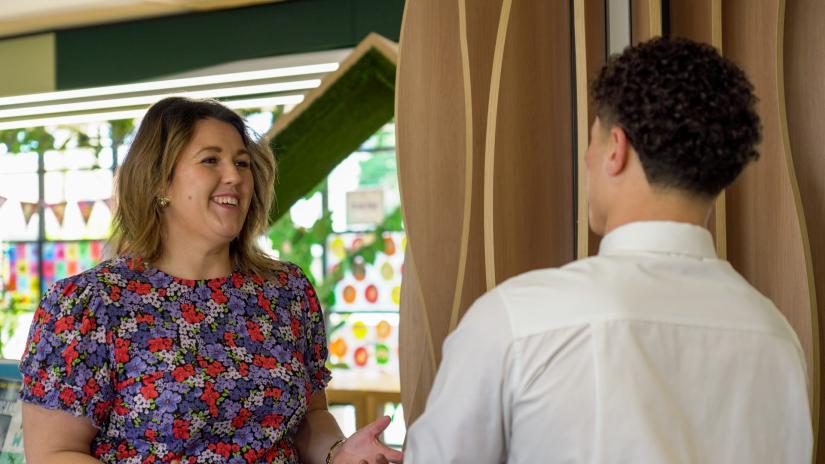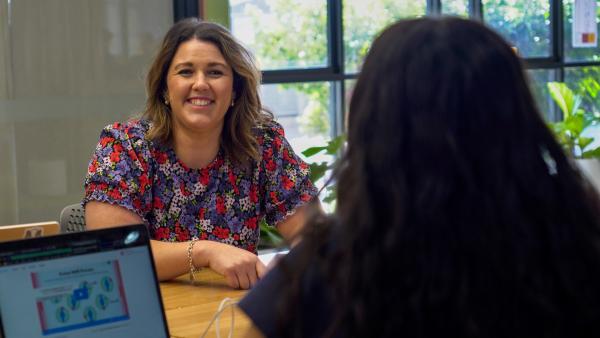As an English teacher, Head of School and Master of Creative Intelligence and Strategic Innovation graduate from the University of Technology Sydney (UTS), Christina Luzi is challenging schools to think differently about the future of education.
When Christina started out as an English teacher, she wanted to make sure every kid in her classroom liked poetry and books. But this came with an important lesson.
“I realised quickly that yes, I need to love those things, but they don’t need to,” she said.
“They need to work out their own interests and passions and form their own opinion of the world. I think in our current climate, adolescents are the most insightful group of people: they’re more in tune with our world right now than anyone else, and we can learn a lot from them."
To this end, Christina wants to redefine the role schools play in our society by breaking down hierarchical structures, putting autonomy at the forefront – and empowering students to take charge of their own learning. Through this approach, she’s optimistic that our education system can keep up with the demands of modern society and raise a new generation of confident, emotionally intelligent and socially responsible leaders.
According to Christina, much of our school curricula and systems are stuck in old ways of thinking. She believes that while teachers and schools play an integral role in preparing students for ‘the real world’, under the confines of the current structure it’s almost impossible to get right.
“As teachers, of course we’re passionate advocates for our context, whether it’s teaching English literature or history. But we’re also shaping the person so our students can go out into the world and have a voice and make an impact,” she said.
The start of the journey
Christina knew early on that she wanted to become a teacher. Growing up, she was a curious kid who “leaned into opportunities and didn’t like the idea of being constrained," she said.
She attributes her career choice and confidence to her family and some highly influential teachers.
“They were the kind of teachers that challenge you to maintain your identity and encourage you to grow and thrive as yourself,” she said.
While she began as an English teacher, Christina has since worn many hats including working as a Curriculum Leader, Wellbeing Coordinator, Director of Learning and Pedagogy, and her current role as Head of School for Years 9-12 at St John XXIII Catholic College Stanhope Gardens in Sydney. Christina was also an Assistant Principal at the young age of 30, which at the time was the youngest in her school system.
Prior to the COVID-19 pandemic, Christina was already implementing her vision for the future of education. She knew, however, that if she was going to challenge the status quo she needed more tools in her belt to give her initiatives more impact. This led to her starting a Master of Creative Intelligence and Strategic Innovation at UTS in July of the very first lockdown.
“It was the call I needed, and the perfect time because there were 12 in the class – and we were all uncertain for the future,” she said.

Christina Luzi (left) studied a Master of Creative Intelligence and Strategic Innovation at UTS.
Christina’s class discussions involved a rethink of their workplaces. Students presented their own challenges to unpack and explore and were then able to take the ideas away to experiment. Something Christina loved about her course was the ability to exchange ideas and learn from others in different industries or professions. She offered her peers techniques to help navigate different stakeholder motivations, as well as more engaging ideas for organisational learning including bringing more play and joy to their sessions. In return, she said her peers taught her how to be more strategic.
“They gave me tools to elevate my thinking, navigate a problem and create a solution. They gifted me an understanding of organisations and how to mobilise a group of people to think differently,” she said.
Christina said the master’s program has made her see the world differently, and she calls it “a life-changing experience." The non-formulaic style of the course, and its alignment with her professional role and goals for the future, meant that it didn’t feel like additional work – making the work/life/study juggle easier.
Putting her studies into action
Since completing her master’s program, Christina said it’s exciting to see how the lessons learned through the course have helped put her vision for empowered, conscientious, and motivated students into practice.
One of Christina’s biggest takeaways was the importance of a shared vision. After a restructure, she facilitated conversations with staff, students, and parents to re-establish the vision for their school.
“Everyone in the school community now knows our vision. They’re given the autonomy to create initiatives and make decisions that align with it, and it’s removed the former hierarchical layers that slow down change,” she said.
This shift also saw pupils go from just voicing their opinions to feeling they have the agency to do something about it.
“We ask our students to not come to us with just a problem, but rather a solution and we will support them to make it happen,” she said.
“Our students are empowered to develop their own initiatives, and if it doesn’t work out, it’s an opportunity for a lesson to be learned.”
To spread the word beyond the school gates, Christina and her colleagues created the Kaleidoscope Movement. As part of the movement, they hosted an evening with 100 educationalists, parents, and school partners where they ran creative workshops to share insights for the future of education. She has also initiated a podcast series to help communicate her vision, encourage idea sharing, and get others to rethink education, which she attributes as a product idea from her master’s studies.
Christina's ambitions for applying her postgraduate studies to her work are endless, but she has a few ideas for where to start. They include giving students real-world industry experience to demonstrate from an early age the relevance of their learning to their future career. She also wants to declutter the syllabus and rethink approaches to the measuring criteria that evaluates student success.
Her connections with UTS and its School of Transdisciplinary Innovation are helping her kickstart this work. She is currently collaborating with UTS on a research project with her school to test and learn new organisational approaches and think critically and creatively about its strategies.
“Since my interactions with UTS, I think differently. I am reflective, I look for what isn’t being said, and I question the way we do things to see if there’s a better way,” she said.
Are you thinking about further study? Looking for ways to find creative and innovative solutions to challenges in your industry? Learn more about the postgraduate experience at UTS and explore our course options. Enquire about postgraduate study at UTS here.


